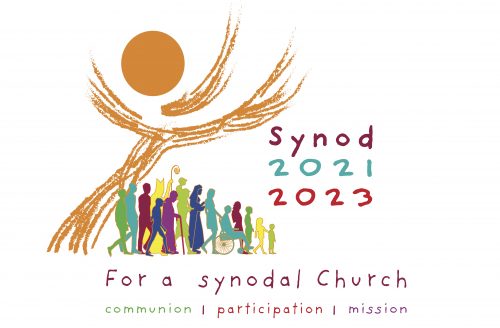WHAT EXACTLY IS A “SYNOD?”
In the most general terms, “synod” means a gathering, a “coming together” on the way or journey. It is an ancient word that has a particular and fascinating life in the Church.

In September 1965, Pope St. Paul VI issued a “motu proprio,” an official papal action to establish the Synod of Bishops for the Universal Church. Drawing on the spirit of renewal that animated the Church in the Second Vatican Council, the synod became a perpetual way for the pope and the bishops of the world to be more closely unified in purpose, and for the Church itself to be more informed and responsive to the needs of the world.
Practically speaking, the pope could call a synod into session whenever he deemed it appropriate, determining the place, those who would come forth, and the topics of discussion. Like a council, a synod is grounded in prayer and purpose, with dedicated time for listening and learning. Synods may conclude with specific actions or teachings to be adopted by the Church, but that is not necessarily what they are for.
Pope Francis has utilized the Synod of Bishops considerably since his election in 2013, notably on the topics of the family (2014), youth (2015) and the Pan-Amazonian Church (2019). In these, he has especially called for all the People of God to participate, in recognition of their dignity and shared ministry in the life of the Church. In announcing this current synod, the pope drew on the words of “Lumen Gentium,” a document of Vatican II, noting that the People of God are to be specifically consulted as they “share also in Christ’s prophetic office.”
From the very beginning, Christianity has been shaped by the faithful coming together to listen and learn from each other, especially in challenging times. We know that St. Paul and his companions met with St. Peter and St. James in Jerusalem to determine a way forward in ministering to both Jews and Gentiles.
 As the faith grew, so did differences and new occasions for seeking to understand them. Gatherings, often called councils and sometimes synods, were called by elders and representatives to address issues and determine working solutions. The Council of Nicaea (A.D. 325) marked the first of seven ecumenical councils, taking place only a few years after the legalization of Christianity. For the next several hundred years, these councils would shape the Church’s doctrine and organization, allowing bishops to be united in the faith, and at the same time to be appropriately autonomous in caring for their own regions.
As the faith grew, so did differences and new occasions for seeking to understand them. Gatherings, often called councils and sometimes synods, were called by elders and representatives to address issues and determine working solutions. The Council of Nicaea (A.D. 325) marked the first of seven ecumenical councils, taking place only a few years after the legalization of Christianity. For the next several hundred years, these councils would shape the Church’s doctrine and organization, allowing bishops to be united in the faith, and at the same time to be appropriately autonomous in caring for their own regions.
The significance of this current synod cannot be understated. It is the first of its kind in the history of the Church.
Like the Second Vatican Council, which has so shaped him, Pope Francis aims to see this current synod as a catalyst for a new path forward — one in which the Church is genuinely renewed, and the People of God draw closer together in three key ways: communion, participation and mission. In opening the synod, the pope stated, “I want to say again that the synod is not a parliament or an opinion poll; the synod is an ecclesial event and its protagonist is the Holy Spirit. If the Spirit is not present, there will be no synod.”
WHAT DOES THIS MEAN FOR THE DIOCESE OF ST. CLOUD?
In the weeks ahead, the Diocese Synod Team will connect with ACCs, parishes, schools, ministries and organizations to initiate consultations of the people, sharing resources and tools to help get started. As the central activity of the synod is listening, creating opportunities for people to build trust and fellowship will be especially important.
From the start, Pope Francis has been clear that our efforts must include as many people as possible, especially those who are most vulnerable, marginalized, disaffected or disaffiliated with the Church. We are asked to ensure that our efforts are authentic, honest and open for people to share their experiences and dreams alike. Consultations are envisioned to take many forms: prayer, pilgrimage, shared meals, celebrations, social activities and more. There will be in-person and online options as well.
This phase of the Synod will conclude in August 2022, at which time the Diocese Synod Team will compile a document, a synthesis of listening for the continental phase of the synod, which begins in September 2022. But this is in no way the exclusive work of what lies ahead.
In his synod opening remarks, Pope Francis called this an opportunity “to become a Church of closeness,” to go “back to God’s own ‘style,’ which is closeness, compassion and tender love.” Quoting theologian Yves Congar from the Second Vatican Council, he said, “there is no need to create another Church, but to create a different Church,” one that is “open to the newness that God wants to suggest,” capable of drawing the whole of the People of God together in the journey.
We are embarking on a truly historic journey in this synod. And there is more than enough room for all of us.
David Fremo is director of the diocese’s Office of Catholic Education Ministries. He also is serving as the diocesan synod liaison.





















